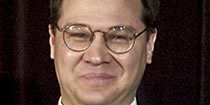Archived Content
Information identified as archived is provided for reference, research or record-keeping purposes. It is not subject to the Government of Canada Web Standards and has not been altered or updated since it was archived. Please contact us to request a format other than those available.
Richard G. Delisle
SSHRC Postdoctoral Prize
 |
|
"The history of life on earth is 99 percent the history of extinct species. Can human beings escape the same fate? In my view, one means of escape is to gain a better understanding of our environment." |
Richard G. Delisle has earned two doctorates—one in philosophy of science from the Université de Montréal and the other in paleoanthropology from the University of Witwatersrand in South Africa—but, at the same time, he likes to get his hands dirty. He has worked on archeological digs in the south of France and paleontological excavations in the western United States. He also wrote the book Debating Humankind’s Place in Nature, 1860-2000, published in 2006 and based on his PhD work in paleoanthropology. His second book, based on his philosophy thesis, is scheduled for publication in 2008.
Delisle is currently pursuing research at the University of Chicago. His project there examines the historical period during which the theory of evolution took shape (1790-1860), and, specifically, the scientific issues raised by the theory’s founders. In the opinion of the scientific community of the time, the theory of evolution was incomplete, since many questions remained unanswered, including those concerning the role and place of the human species in evolution.
As a philosopher who draws on history for his ideas and inspiration, Delisle asks a fundamental question: “What do we know, scientifically, about human beings’ place in nature?” At a time when the future of our planet is a major concern, the question is more relevant than ever. Delisle hopes that his work will contribute to public reflection and discussion on the issue, and provide input for the decisions that politicians will have to make for the environmental future of the globe.